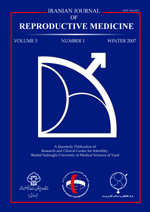
|
International Journal of Reproductive BioMedicine
Research and Clinical Center for Infertility, Shahid Sadoughi University of Medical Sciences of Yazd
ISSN: 1680-6433
EISSN: 1680-6433
Vol. 6, No. 3, 2008, pp. 125-131
|
 Bioline Code: rm08021
Bioline Code: rm08021
Full paper language: English
Document type: Research Article
Document available free of charge
|
|
|
International Journal of Reproductive BioMedicine, Vol. 6, No. 3, 2008, pp. 125-131
| en |
The changes in morphology and morphometrical indices of endometrium of ovariectomized mice in response to exogenous ovarian hormones
Peyghambari, Fatemeh; Salehnia, Mojdeh; Moghadam, Mehdi Forouzandeh; Valujerdi, Mojtaba Rezazadeh & Hajizadeh, Ebrahim
Abstract
Background:
The preparation of endometrium for embryo reception and implantation
are controlled by ovarian hormones. These hormones have distinct cyclical changes
during estrus cycle.
Objective:
The aim of this study was to evaluate the changes in morphology and
morphometrical indices of endometrium by daily injections of estrogen and
progesterone in ovariectomized mouse.
Materials and Methods:
In total 60 adult NMRI female mice were ovariectomized and
after two weeks, they were randomly divided into five groups: control, sham group,
estrogen treated mice (which received daily dosage of 0.5 ml/mouse of hormone for five
days), progesterone treated mice (which received daily dosage of 0.2 ml/mouse of
progesterone hormone for five days) and estrogen-progesterone treated mice (they
received 0.5 ml/mouse estrogen on the first day and 0.2 ml/mouse progesterone
injections from the second day to the fifth day of treatment). The mice were sacrificed
in every day (n=5) up to five days after treatment and their uterine horns were obtained
and processed for morphological and morphometrical studies.
Results:
On the second day of treatment, the diameter of glands was observed to be
more in the progesterone group (53.75±6.32μ) than this in the estrogen (45.13±7.78 μ)
and estrogen-progesterone treated groups (48.17±13.58 μ). While, the number of glands
(76.25±17.37) and thickness of endometrium (39.58±3.37 μ) were observed to be more
in the estrogen treated group (p=0.01).
Conclusion:
Progesterone had effect on the gland whereas estrogen caused increased in
height of surface epithelium of endometrium. Overall, the day 2 after treatment (in all
experimental groups) is suitable day for sampling for further studies.
Keywords
Endometrium, Exogenous ovarian hormones, Ovariectomized mice, Morphometry, Morphology.
|
| |
© Copyright 2008 - Iranian Journal of Reproductive Medicine
Alternative site location: http://www.ijrm.ir
|
|
